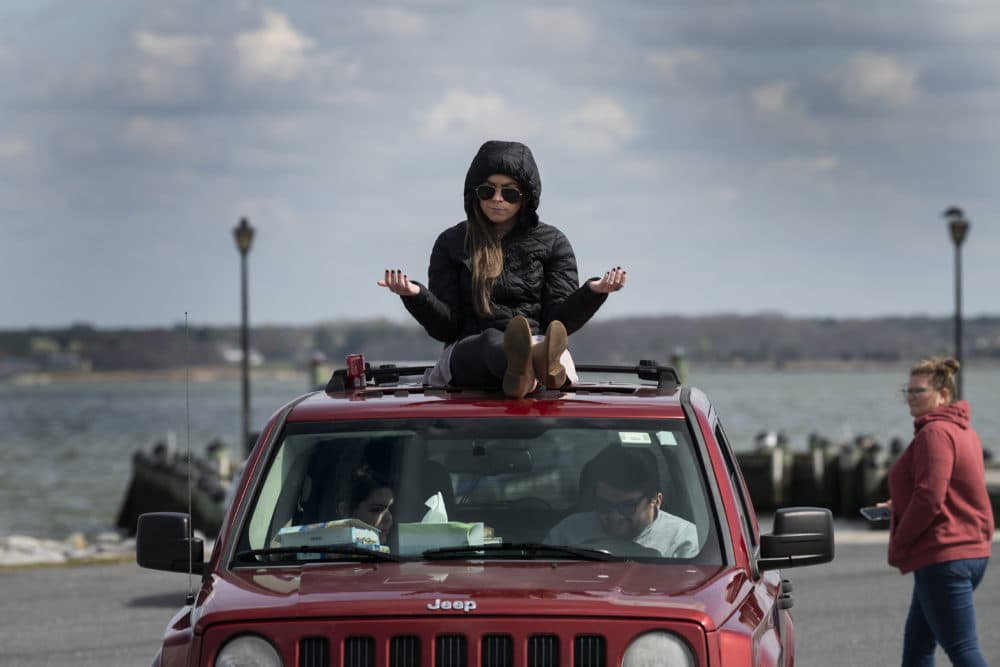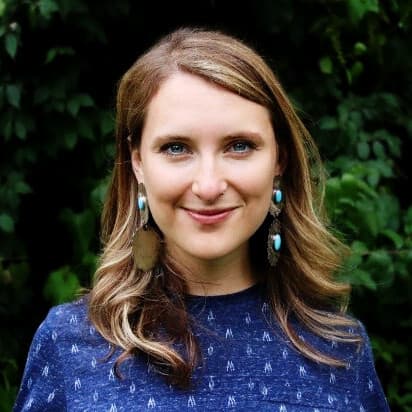Advertisement
Coronavirus: How Religious Communities Are Worshiping Together While Apart
Resume
We discuss how faith communities across America are worshiping together during the coronavirus outbreak.
Guests
Elaine Howard Ecklund, director of the religion and public life program at Rice University. Professor of sociology. (@RiceRPLP)
Rabbi Rachel Greengrass, associate rabbi and Jewish life coordinator at Temple Beth Am, a Reform synagogue in Pinecrest, Florida. (@RabbiGreengrass)
Reverend Joshua Lazard, minister at Duke University Chapel. Adviser to Duke University's student gospel choir, "United in Praise."Associate minister at Mount Level Missionary Baptist Church. (@theuppitynegro)
Imam Omar Suleiman, founder and president of the Yaqeen Institute for Islamic Research. Resident scholar at the Valley Ranch Islamic Center. (@omarsuleiman504)
Interview Highlights
On how religious communities are adapting to the coronavirus
Reverend Joshua Lazard, associate minister at Mount Level Missionary Baptist Church: “For the first time in the history of the church, we went online. We were able to contact somebody to set us up for Facebook livestream. And, you know, I think that that is what a lot of churches had to go through this last week. For the first time, they actually had to use the technology that perhaps, you know, maybe they've been a little bit slow to adapt for certain reasons. But it was a shoestring crew of members. … It was different. It was new. It was weird, it was unfamiliar. But it was a way in which we could connect. And based on the views that we got, we actually got more views through Facebook livestream than we normally see in terms of just your average Sunday attendance.”
Reverend Joshua Lazard: “There were no congregants. I mean, so it's an interesting thing to kind of look out and see that there is nobody in the pews. How do you have worship? How do you do this faith thing? How do you still connect with people?”
"How do you have worship? How do you do this faith thing? How do you still connect with people?”
Reverend Joshua Lazard
Rabbi Rachel Greengrass, associate rabbi and Jewish life coordinator at Temple Beth Am: “So much has changed. We spent quite a bit of time planning just in case the coronavirus came to our area. And of course, like the rest of the country, our concern is for the health of our congregants and for our community. So a lot has changed. We are streaming services every day at the same time. We have a daily live show where we’re interviewing members of the community. Rabbi Barras is doing that via Zoom and livestream. I'm taking classes via Zoom and Google Meet. Both for our general members and our school. We have a day school and our teachers there have really stepped up. Facebook Live and streaming has been really important for us for shorter offerings. Of course, we're doing a lot of counseling, making tons of phone calls, especially to the elderly who might be more isolated and to health care workers who are on the front lines. And really sharing a lot of coping mechanisms with the community about how to deal with anxiety.”
Imam Omar Suleiman, resident scholar at the Valley Ranch Islamic Center: “We’ve had to deal with what every congregation has had to deal with, which is essentially learning overnight how to be portable and digital. Thankfully, we already used to broadcast everything that we would do at the mosque. But obviously, there are certain things that, you know, missing out on the congregation on the Friday prayer. This is really unprecedented in our lifetimes. And of course, this entire coronavirus is unprecedented in our lifetimes.
"But, you know, having to move everything online has obviously been difficult, not just for us in terms of providing the services that are necessary, but also just getting our congregation to move there, particularly for our communities since we have the five daily prayers. And those are primarily attended in the mosque, at least, by elderly, retired communities that might not be as tech savvy and that have that as their primary social outlet.
"So, for us, to be clear, I mean, we still do our five daily prayers. You know, as we would in the mosque. Our Friday congregational prayer is temporarily suspended. And so any sermon that's going to go online on Friday afternoons is not actually a replacement for the Friday sermon. It's just to help people get along during these times. And they're basically told to pray the second prayer of the day as they would on the other six days of the week.”
On the spiritual, economic and social resources faith communities provide for congregants
Elaine Howard Ecklund: “We know from broader research that faith communities provide spiritual resources, but they also provide economic resources, and social resources and sometimes job resources to people. And so one fears that if they're not meeting physically, that some of those collateral resources that they provide might go away. So that's what's on my mind, that they can be a benefit to people during this time. But also faith leaders and other kinds of leaders need to think critically about what will happen if faith communities can no longer provide the kinds of collateral resources that they provide people during this time.”
On technology and faith communities
Elaine Howard Ecklund: “We know from research that faith organizations are the most numerous civic organization in the U.S. So they're the place that the non-economic, the non-for-profit place that people gather the most. And so we could see them really lead the way in how to use technology creatively to gather.
"I'll say as an aside, in previous survey work we've done across the U.S. on faith and science, sometimes faith leaders have some suspicion of technology, especially social media technologies, because they worry that especially for youth, these technologies will take them away from the faith because there is just the kind of attention that the technologies require makes it hard sometimes for youth to attend to spiritual matters.
"And so I wondered and I'm eager to study this. Is there a way in which the time of coronavirus, this unprecedented time might also be a space for those in mosques and synagogues and churches to really see a kind of, for lack of a better way to put it, a kind of redemption of social media technologies? And they might lead the way, even though they've been somewhat suspicious sometimes in the past.”
On what this moment means for faith communities
Elaine Howard Ecklund: “Religious communities, and sometimes rightly, [have] been critiqued for being divisive. But yet we see here in this conversation incredible evidence of the riches of three traditions for building community and emphasizing a common humanity. Everyone right now is experiencing the coronavirus in some ways. And within our faith traditions, we have capacity to build creative community during this time where otherwise we might be divided.”
"Everyone right now is experiencing the coronavirus in some ways. And within our faith traditions, we have capacity to build creative community during this time where otherwise we might be divided.”
Elaine Howard Ecklund
From The Reading List
Christianity Today: "It’s Hard to Close Black Churches amid COVID-19" — "When deciding to close the doors of black churches, congregational leaders across the US wrestle with unique considerations. Paul J. James, pastor of CareView Community Church in Lansdowne, Pennsylvania, noted in an interview with The Undefeated how closing is 'counterintuitive to most churches, especially the black church… where we’re just glad to get together because of how hard life has been historically for us here in America. Church has been a safe place for us. It’s been a safe harbor. Now here we are faced with the inability to come together.'
"Last week, the federal government strongly urged Americans not to gather in groups of more than 10, and restrictions keep coming. We suspect that many churches will close in the near future, but the decision will not been easy.
"In St. Louis, the mayor hosted a teleconference with 300 clergy, including many of black churches, to urge them not to hold services. While some chose to stop meetings and modify their ministries, others struggled to make the change."
Houston Public Media: "Religion In Quarantine: How Faith Groups Are Adapting To The Coronavirus" — "This past Sunday morning, the cantor sang a familiar psalm at the 11 a.m. Mass at St. Anthony of Padua in The Woodlands: 'The Lord is my shepherd; there is nothing I shall want.'
"Usually, some 1,500 parishioners sing in response. Except this Sunday, the pews were empty. Instead, some 3,000 people were watching on Facebook. 'It’s definitely what I would call a new ballgame,' said Rev. Tom Rafferty, pastor at St. Anthony.
“'And I think it’s going to have an effect on how we do church long after this virus.'
In this time of quarantine, nearly all religions have to figure out how to practice their faith without being physically together to celebrate, whether it’s Easter, Passover or Ramadan.
"At first, several groups in the region decided on their own to practice social distancing and suspend public congregations, including the Archdiocese of Galveston-Houston, many synogogues and the Islamic Society of Greater Houston. That became an order Tuesday, with Harris County’s new directive for residents to stay home except for essential workers. The order allows faith leaders, however, to still minister one-on-one for spiritual guidance and mental health."
Time: "How Religious Leaders Can Help Stop the Spread of Coronavirus" — "More than a third of all American adults attend religious services each week, and some 50% belong to some religious institutions. Based on my research on our religious communities, I believe that even with their doors closed, religious organizations can still be vital partners in transmitting accurate scientific information about the coronavirus.
"For the past 15 years, I have been studying the interactions between religious and scientific communities. While we may regard religion and science as at odds in our culture, the fact is that many Americans rely on their religious leaders to guide their attitudes about scientific findings.
"In my forthcoming book, Why Science and Faith Need Each Other: Eight Shared Values That Move Us Beyond Fear, I show that 34% of evangelical Protestants and about 17% of all Americans say they would consult their religious leader with a question about science, especially science that seems to have moral implications."
This program aired on March 26, 2020.

